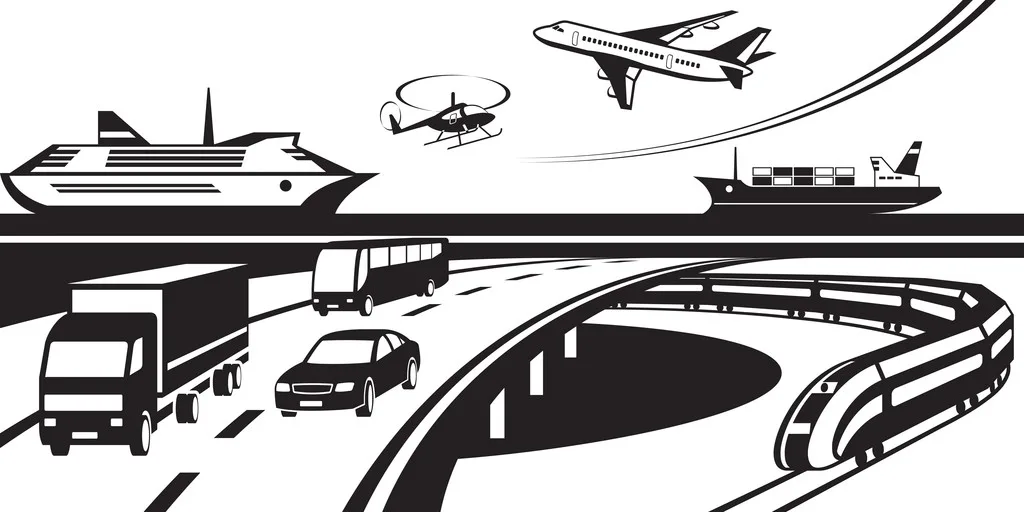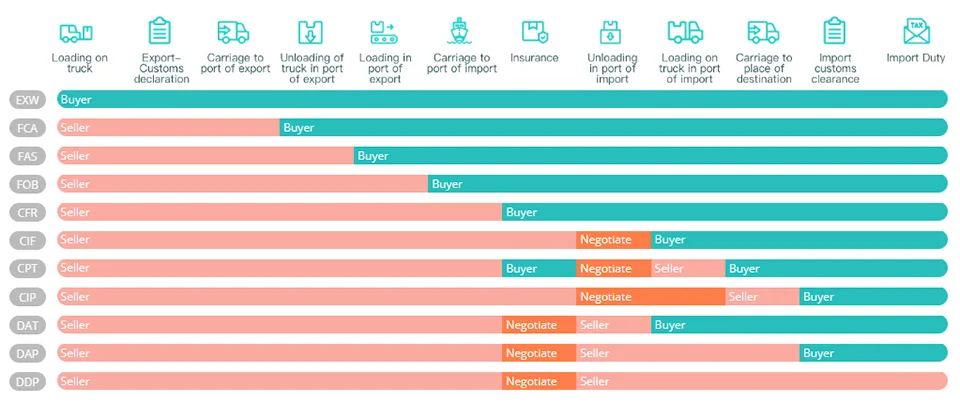Shipping goods across borders can be tricky. There are so many factors to consider for both importers and exporters. This is why Incoterms were created. So what are Incoterms? In international commerce, Incoterms are a set of three-letter abbreviated trade terms established by the International Chamber of Commerce (ICC) to communicate different aspects of cross-border trade.
Responsibilities Connected To Incoterms
First of all, Incoterms definitions explain the following rules of the shipment process:
Shipping and freight costs: Incoterms dictate which party will be responsible for the costs of shipping and freight.
Point of Delivery: Incoterms indicate the point at which the responsibilities are transferred from the seller to the buyer (the delivery point).
Import and export regulations: Incoterms dictate which party organizes the procedures used in importation and exportation.
Insurance cover: Incoterms outlines who is responsible for the costs of insurance.
Incoterm Groups
Incoterms can also be sorted into 4 groups:
- E type (EXW): The seller bears little cost and responsibility.
- F type (FOB, FCA, FAS): The seller is responsible for transporting the goods to the buyer’s predefined transport medium, and then the buyer assumes all responsibilities from that point onwards.
- C type (CFR, CIF, CPT, CIP): The seller bears all costs and responsibility to the destination port; then the risks are transferred to the buyers once the goods are loaded on the means of transport.
- D type (DDP, DAP): The seller bears maximum responsibility for cost and risks.
List And Summary Of Incoterms

From responsibilities in international shipping to understanding customs clearances in countries like China, duties payment, and insurance, there are many factors to consider when choosing Incoterms. Here are some of the most important and often-used Incoterms:
Ex Works (EXW Incoterm)
Ex Works places a minimal burden on the seller. The buyer must arrange and pay for all transportation and is responsible for container loading. The seller does not need to load the goods on any collecting vehicle, nor does it need to clear the goods for export.
Free On Board (FOB Incoterm)
The seller is responsible for all the costs and responsibilities and clearing the goods for export until they have crossed the ‘ships rail’ at the origin port. Then the buyer assumes all costs, responsibilities, and risks after that point.
Cost and Freight (CFR Incoterm )
For CFR Incoterms The seller arranges the transport of goods to the named port. The seller delivers goods, cleared for export, loaded on board the vessel. Then the risks are transferred to the buyer once the goods are loaded on board.
Cost Insurance and Freight (CIF Incoterm)
This Incoterm is the same as Cost and Freight (CFR) with the added responsibility that the seller also pays for the insurance.
Carriage Paid To (CPT Incoterm)
The seller delivers goods to a carrier (named by the seller) and has full responsibility to cover the cost of the carriage of goods to the destination. All risks and costs transfer to the buyer after delivery of the goods.
Carriage and Insurance Paid To (CIP Incoterm)
In terms of CIP Incoterms, the seller is responsible for delivering the goods to a carrier and also paying the cost of transport. The seller is also responsible for insuring the goods.
Delivered at Place (DAP Incoterm)
The seller is responsible for delivering the goods, ready for unloading from the arriving means of transport, at the named place. The buyer is responsible for import clearance and any applicable local taxes or import duties.
Delivered Duty Paid (DDP Incoterm)
The seller assumes all costs, responsibility, and risk until the goods are delivered to the buyer. That means the seller also pays for import clearance duties, insurance, and any other related expenses.

How to Choose the Right Incoterm
Choosing the Incoterm that best suits your international shipment can be challenging, and requires a lot of thought. So, how should you decide which Incoterm is right for you?
The biggest factor is the experience level. Incoterm FOB (Free on Board) is the most popular Incoterm and is often agreeable to both the buyer and seller. As a partnership, Incoterm FOB often makes the most sense to have the seller be responsible for the goods when they are on his/her home soil, and then the buyer takes over for the overseas transit. The seller’s risks end once the cargo is on the boat, and the buyer still has control over all expenses and the coordination of the cargo delivery to its final destination.
If you are a more experienced importer, want to have absolute control over the shipping process and associated costs, and feel comfortable taking on more risk and responsibility to get it, you may want to choose Incoterm EXW (Ex Works).
While EXW places a minimum obligation on the seller, Incoterm DDP (Delivered Duty Paid) represents the maximum obligation. It is the only rule that requires the seller to be responsible for import clearance and payment of duties and taxes.
Therefore, the seller may also need to acquire an import license. An experienced seller can benefit from this system as they would have total control over costs, including factors to maximize their profit. However, importers/buyers who have more experience are more likely to avoid this shipping agreement.
Useful links:ALL-IN-ONE PACKAGE TRACKING

